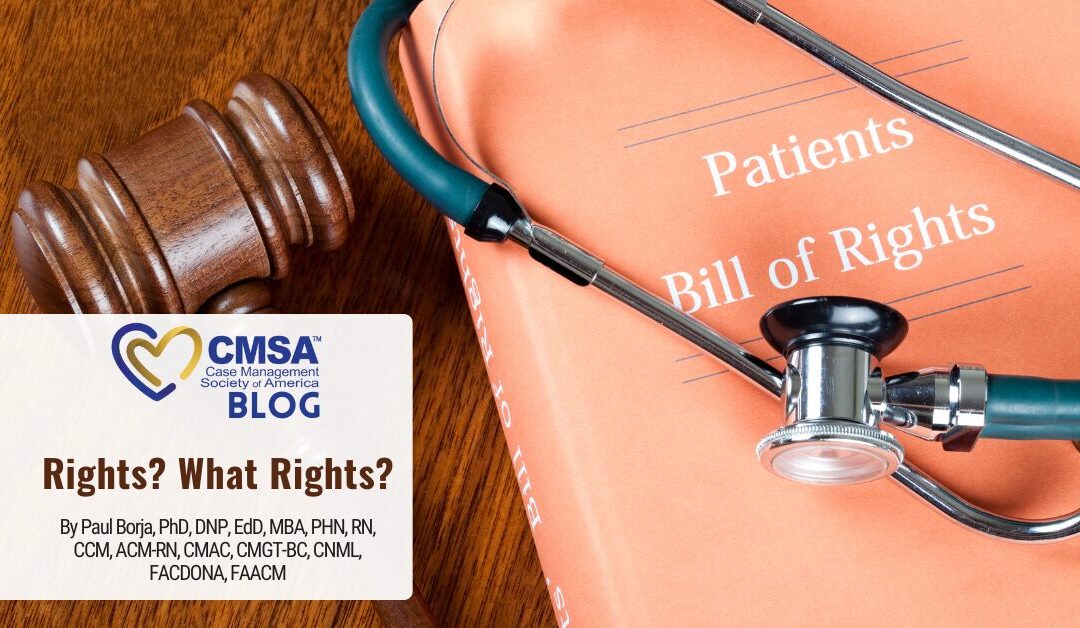By Paul Borja, PhD, DNP, EdD, MBA, PHN, RN, CCM, ACM-RN, CMAC, CMGT-BC, CNML, FACDONA, FAACM
With the rise of baby boomers, we see an increase in the number of individuals utilizing skilled nursing facility settings. A SNF (Skilled Nursing Facility) is a temporary residence for patients undergoing medically necessary rehabilitation or nursing care for intravenous antibiotic therapy, wound care, etc. This, however, serves as a blanket name for a long-term care facility (LTC) or nursing home, a permanent residence for individuals who need assistance with at least two daily activities (ADLs). Often, we think of these facilities as an extension of the acute care setting, and practices are the same at both institutions.
With these long-term care facilities, patients are labeled as "residents." Nursing home residents have specific rights that must be honored. These residents' rights are often connected with a State or Federal regulation that would provide nursing home evaluators/surveyors to sanction facilities that do not comply with these regulations. These are specified under the Code of Federal Regulations (CFR) 483.10. This section states that residents have the right to a dignified existence, self-determination, and communication with and access to persons and services inside and outside the facility (CMS, 2016). These regulations allow residents to retain their fundamental civil and human rights. According to the Code of Federal Regulations, here are the Categories of Residents' Rights:
- Right to Be Informed: Rights/Rules/Regulations
- Right to Participate in Treatment
- Right to Access
- Right About Financial Affairs
- Right to Voice Grievances
- Right for Respect and Dignity
- Right for Self-Determination
Each category has specific rights that we must abide by. The Massachusetts Advocates for Nursing Home Reform summarized these at https://manhr.org/wp-content/uploads/2019/11/Resident_Rights.pdf.
According to the California Department of Public Health, residents have rights that relate to general categories that include:
- Admissions Rights
- Quality of Life
- Visitors
- Privacy and Confidentiality
- Choosing How to Spend Your Time
- Grievances
- Participation in Groups and Activities
- Living Accommodations
- Quality Care
- Protection of Money and Possessions
- Medical Care and Treatment
- Freedom from Abuse
- Transfer and Discharge Rights
- Resident Records
- Free Choice
- Participation in Care Planning
- Freedom from Physical and Chemical Restraints
Almost all states, if not all, have their versions of the Residents' Rights, but all encompass and address the same fundamentals of CFR 483.10.
The Federal government takes the enforcement of these rights seriously. To ensure compliance, they have established deficiencies known as F-tags, which correspond to the need for facilities to write corrective action plans. Some of these deficiencies can have significant financial implications or even equate to substandard quality of care. This underscores the importance of understanding and adhering to residents' rights in long-term care facilities.
This set of rights had been established to ensure that these residents are afforded the same level (if not more) of treatment as that of individualized who are not institutionalized.
References:
CDPH (n.d.). Your Right as Resident in a Nursing Home. Nursing Home Residents Rights. Retrieved from https://www.cdph.ca.gov/Programs/CHCQ/LCP/CDPH%20Document%20Library/Residents'%20Rights%20Packet/RightsAsResident.pdf.
Centers for Medicare and Medicaid Services (2016). Code of Federal Regulations. Retrieved from https://www.ecfr.gov/current/title-42/chapter-IV/subchapter-G/part-483/subpart-B/section-483.10.
Centers for Medicare and Medicaid Services (2021). List of Revised FTags. Retrieved from https://www.cms.gov/Medicare/Provider-Enrollment-and-Certification/GuidanceforLawsAndRegulations/Downloads/List-of-Revised-FTags.pdf. MANHR (n.d.). Residents’ Rights. Retrieved from https://manhr.org/wp-content/uploads/2019/11/Resident_Rights.pdf
Couldn’t make it to Providence for #CMSA2024? No problem! Register for our digital component (59 CE Hours) and enjoy access to all main conference concurrent sessions: ![]() https://cmsa.societyconference.com/ Digital access remains open for viewing and evaluating until July 31—Maximize your CE earnings from your home or office!
https://cmsa.societyconference.com/ Digital access remains open for viewing and evaluating until July 31—Maximize your CE earnings from your home or office!
Bio: Paul Borja, PhD, DNP, EdD, MBA, PHN, RN, CCM, ACM-RN, CMAC, CMGT-BC, CNML, FACDONA, FAACM is very passionate about education, health equity, and focus on social determinants of health. He has been in the healthcare industry for 18+ years as a nurse, educator, case manager and leader in different facets. Paul has always sought for opportunities to serve his community and the profession he is in. Paul looks forward to giving more of his time and expertise to important causes. He is a multi-site Director for Adventist Health Lodi Memorial and Dameron Hospitals and an Adjunct Professor of Administration and Management at California Coast University. He was a recipient of the Kaiser Permanente Continuity of Care Excellence Award in 2017 and 2018. He had recently been featured by Aidin for their #CMSpotlightAward. He is currently the CMSA National Board Secretary and the President of CMSA Sacramento Chapter. He is a Fellow for the American Academy of Case Management and Association of Certified Directors of Nursing Administration.

